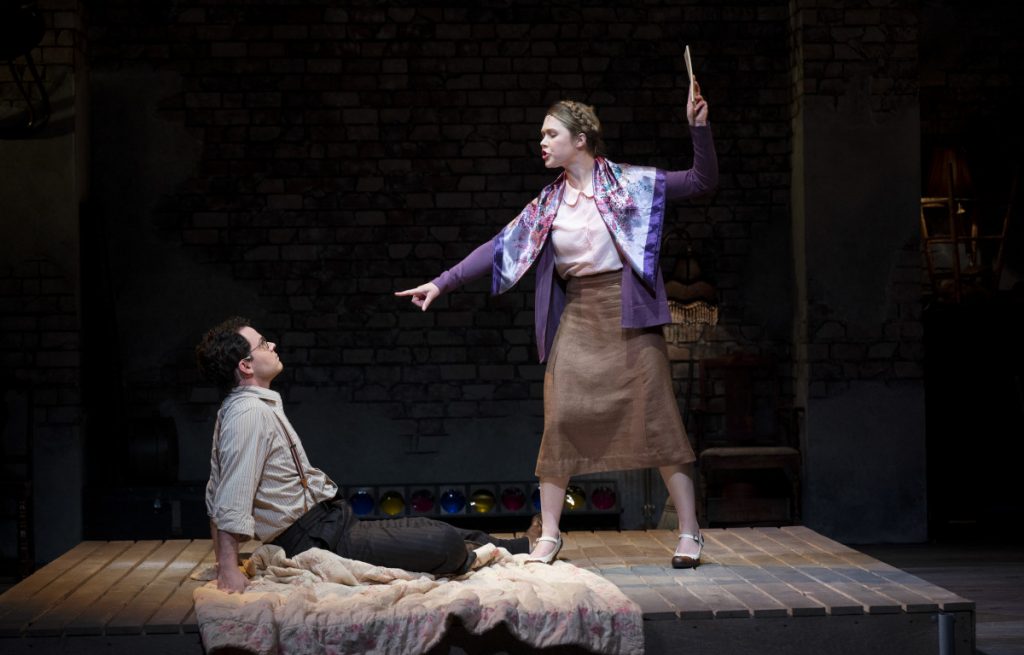Ellen Nikbakht and Rebeca Robles, the conservatory actors who play the two female leads in Chautauqua Theater Company’s Indecent, quote the play in unison: “You are my warrior! My suffragette!” Those are the words Madje Asch says to her husband Sholem upon reading his play The God of Vengeance, the play on which Paula Vogel’s Indecent is based. Madje feels so empowered by her husband’s play and its liberating imagination of women’s love that she can hardly contain herself.

The God of Vengeance, written by Yiddish playwright Asch in Poland in 1906, centers on a Jewish brothel owner and his family. His daughter, Rifkele, falls in love with Manke, a sex worker in his employ. Indecent, written by Jewish lesbian playwright Vogel, tells the story of the writing, performance and controversial Broadway premiere of The God of Vengeance through a ghostly troupe of Yiddish actors. CTC’s run of Indecent will continue at 4 p.m. Tuesday, July 12, in Bratton Theater.
Nikbakht and Robles play troupe members Halina and Chana, respectively — which Robles referred to as their “umbrella” characters — who then take on a number of different roles, including multiple versions of Rifkele and Manke. Indecent pays rapt attention to Rifkele and Manke’s love story, presenting a tender scene of romance between the two in various iterations.
Nikbakht considers the male gaze in relation to their acting. They spoke about their aversion to being on film and how the eye of the camera produces an instinctually guarded response.
“The camera freaks me out so much because I think I assume worst intentions,” Nikbakht said. “Living in a female-presenting body, I have many experiences of being cat-called, and I think that I just automatically go into defense mode. I don’t think I can act in defense mode, because I can’t be vulnerable.”
On the other hand, both Nikbakht and Robles are interested in how Indecent subverts the male gaze. Rather than presenting The God of Vengeance and its lesbian romance as the product of a lascivious man’s imagination, Vogel frames it as a stirring experience for a woman.
“I think it’s really interesting that the way Paula Vogel wrote it, the first time we hear about The God of Vengeance in Indecent is through the perspective of a woman,” Robles said. “Lisa (Rothe, director of the CTC production) talks about this a lot, that it seems like it was important for Paula Vogel that we first see the play through the eyes of a woman. Sholem Asch’s wife Madje finds it beautiful and empowering. I think that that says something about how Paula Vogel wanted the play to be seen.”
That’s not to say that Indecent shies away from presenting the prevalence of misogyny. Robles said that there are moments of men hitting on her and Nikbakht’s characters sprinkled throughout the play, which she thought was Vogel’s acknowledgment of the inescapable reality of sexism.
As indicated by her initial reaction, Madje sees Sholem’s writing as a liberatory vision. Sholem, a man, being the writer of The God of Vengeance had influence on its outcome; Nikbakht questioned the feasibility of a woman even writing such a story to mainstream success at the turn of the 20th century. Nikbakht mentioned Lillian Hellman’s The Children’s Hour as a play by a woman about love between women, but that play didn’t hit Broadway until 1934. Shows in mainstream venues such as Broadway that center lesbian love are still, in 2022, the exception rather than the rule.
“At the time when The God of Vengeance was written, I’d think that it would have been impossible for that story to get told by a woman,” Nikbakht said.
The love scene between Rifkele and Manke, revisited affectionately throughout Indecent, has one final iteration that’s watched by the character of Sholem Asch and stage manager/quasi-narrator Lemml. Robles considered the complexity and room for interpretation in that moment.
“It’s two men watching this very intimate scene between these two women,” she said. “And that can feel kind of icky, depending on how you’re thinking about it, but I don’t think that’s the intention of the play. It’s not about anything sexual, I don’t think. The memory of it is about freedom, and about finding joy and freedom when you are oppressed.”
Although the initial version of CTC’s production had Sholem and Lemml as the only observers of the final love scene, Robles said that the company has since changed the staging. Instead, the whole theater troupe watches, further decentralizing the male gaze.




